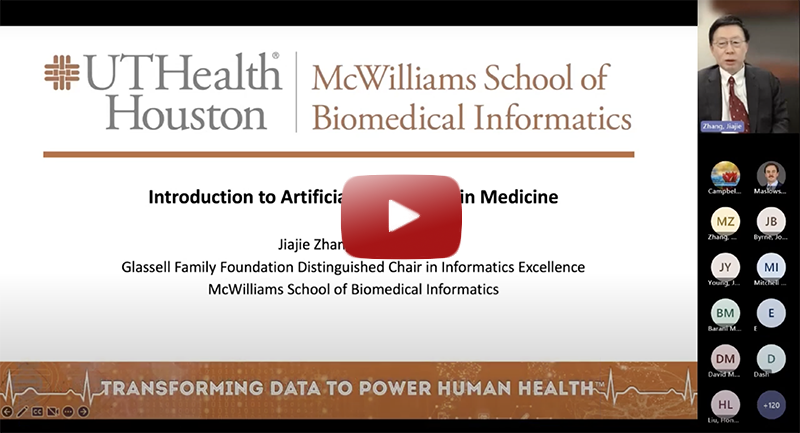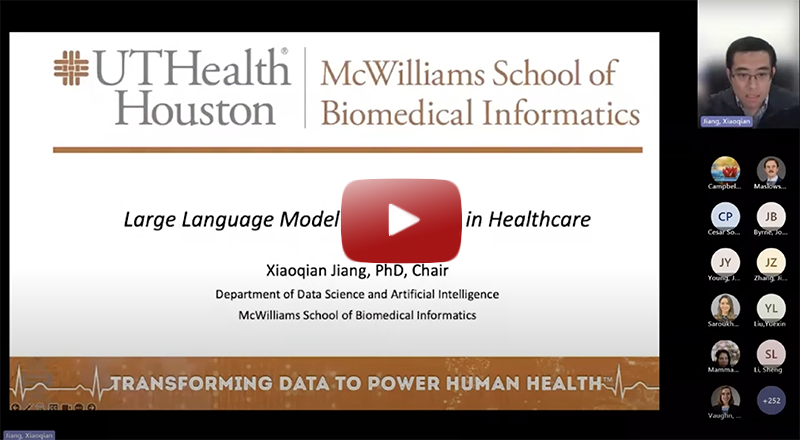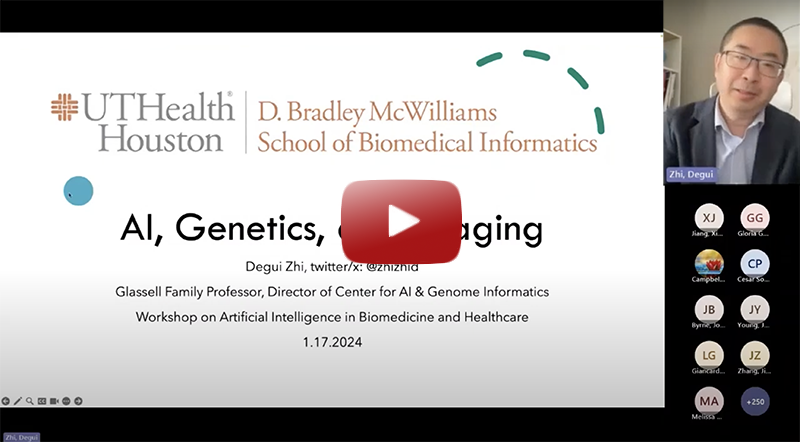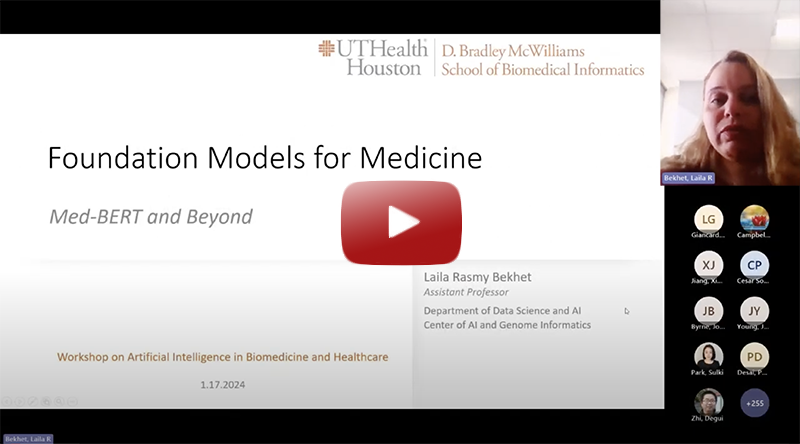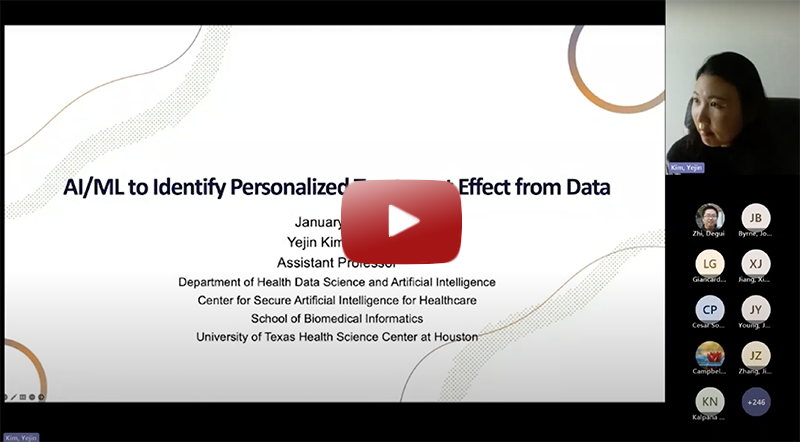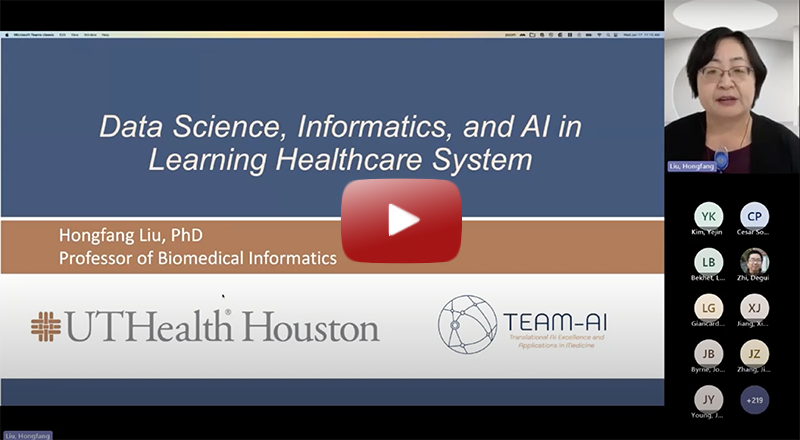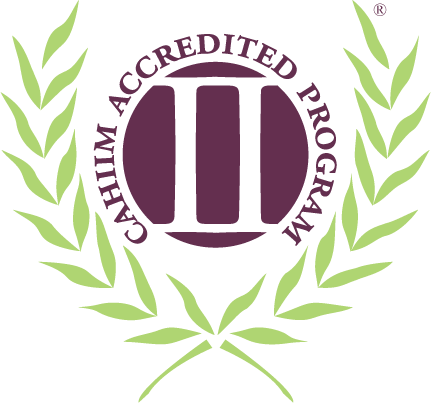
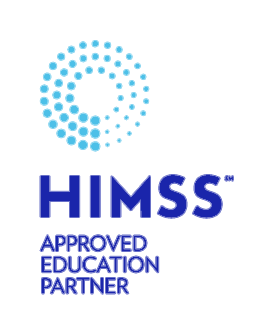

Artificial Intelligence in Biomedicine and Healthcare
The McWilliams School of Biomedical Informatics is designed to empower medical professionals with cutting-edge AI technologies, offering opportunities for professional advancement and access to specialized resources. From innovative applications of large language models in healthcare, demonstrated by experts like Dr. Xiaoqian Jiang and Dr. Jiajie Zhang, to transformative projects in endovascular stroke therapy and Dr. Degui Zhi, we provide insights on the practical integration of AI into clinical workflows. With a focus on enhancing patient care and driving medical research forward, our platform serves as a valuable resource for navigating the evolving landscape of technology and healthcare.
Dean Jiajie Zhang, Ph.D.
“Introduction to Medical AI and McWilliams School"
Dr. Jiajie Zhang discusses AI's influence in medicine, emphasizing practical applications like voice creation and Chat GPT's impact on medical licensing exams. He highlights AI's transformative potential in medical education, UTHealth Houston's achievements, and broader societal implications, offering a comprehensive overview of AI's role in healthcare and technology.
Xiaoqian Jiang, Ph.D.
“Large Language Model Applications in Healthcare”
Dr. Xiaoqian Jiang discusses the applications of large language models (LLMs) in healthcare, addressing their benefits and limitations. He emphasizes careful design to enhance accuracy and showcases real-time applications, highlighting the broad impact of LLMs in healthcare, from drug discovery to clinical workflow automation.
Degui Zhi, Ph.D.
“AI, Genetics, and Imaging”
Dr. Degui Zhi discusses AI's role in defining genetic endophenotypes and discovering brain structure-related genes through innovative approaches in medical imaging. The presentation underscores AI's potential in generating complex phenotypes and advocates for collaborative research across various medical imaging disciplines.
Laila Rasmy Bekhet, Ph.D.
“Foundation Models for Medicine: Med-BERT and Beyond”
Dr. Laila Rasmy Bekhet introduces Med-BERT, emphasizing its application in healthcare, including heart failure and pancreatic cancer risk assessment. She highlights ongoing projects, collaborations, and invites further engagement with the model.
Yejin Kim, Ph.D.
“AI/ML to Identify Personalized Treatment Effect from Data”
Dr. Yejin Kim discusses how AI enhances randomized clinical trials (RCTs), addressing personalized treatment effects and overcoming one-size-fits-all limitations, as seen with Aducanumab. The presentation emphasizes AI's role in estimating treatment effects, identifying responsive subgroups, and simulating trials with real-world data, advocating for its complementary use alongside RCTs.
Hongfang Liu, Ph.D.
“Data Science, Informatics, and AI in Learning Healthcare Systems”
Dr. Hongfang Liu explores the intersection of data science, informatics, and AI in healthcare, emphasizing their role in evidence-based practices. Through projects in precision asthma care and surgical event surveillance, Dr. Liu demonstrates how AI can enhance healthcare delivery, advocating for collaborative efforts to bridge the gap between research and application.
You can become an expert in the field and make an impact in healthcare in a variety of ways:
- Diverse Application Spectrum: Showcased projects illustrate the wide-ranging utility of Large Language Models (LLMs) in healthcare contexts, spanning medical dialogue facilitation, consent process optimization, and chatbot interface refinement.
- Cutting-Edge AI Integration: Leading AI tools like ChatGPT and Med-BERT will drive transformative advancements in clinical workflows and medical research initiatives.
- Advanced Stroke Therapy Solutions: Strategic initiatives employ deep learning methodologies to enhance stroke therapy efficacy, bridging gaps between advanced and accessible imaging modalities.
- Revolutionizing Medical Education: AI-driven approaches promise to revolutionize medical education paradigms, emphasizing skill acquisition and technology's pivotal role in modern healthcare delivery.
- Practical AI Implementation: Real-world demonstrations underscore the seamless integration of AI into clinical workflows, fostering improved patient-doctor interactions and facilitating personalized care delivery.
- Optimized Patient Outcomes: Access to AI-driven decision support systems and robust data analytics platforms empowers healthcare professionals to streamline clinical processes and achieve superior patient care outcomes.
GRADUATE PROGRAMS
Graduate Certificate in Applied Biomedical Informatics
Graduate Certificate in Biomedical Informatics
Graduate Certificate in Health Data Science
Graduate Certificate in Pharmacy Informatics
Graduate Certificate in Public Health Informatics
Master of Science in Biomedical Informatics
Doctorate in Health Informatics
Doctor of Philosophy in Biomedical Informatics
Dual Degree Programs
DEPARTMENTS
Bioinformatics and Systems Medicine
Clinical Informatics and Health Informatics
Health Data Science and Artificial Intelligence
COURSES OFFERED
- Public Health Informatics
- Clinical Healthcare
- Artificial Intelligence
- Bioinformatics
- Project Management
BMI 7151 Seminar in Precision Medicine
1 semester credit hour
Lecture contact hours: 1
Prerequisites: Consent of instructor
Seminar in Precision Medicine will introduce and discuss recent advances, frontier technologies, case studies, and future direction in precision medicine. The topics cover precision medicine, bioinformatics, systems biology, pharmacogenomics, genetics, genomic medicine, study design, methodologies and computational tools. Students enrolled in the course for credit are required to give a seminar presentation, attend at least 80% of the weekly seminars, and fill out evaluation forms. Each student seminar must be supervised by a faculty member (not necessarily the student's advisor). The faculty member will work with students to ensure that the seminars are both appropriate and interesting for the audience.
BMI 6340 Health Information Visualization and Visual Analytics
(web-based and classroom instruction)
3 semester credit hours/meets part of research informatics components
This course introduces the basics of information visualization, which is the use of interactive visual representations of data to amplify human cognition. Properly constructed visualizations allow us to analyze data by exploring it from different perspectives and using the power of our visual system to quickly reveal patterns and relationships. This course uses practical, hands-on examples and exercises to teach the theory and application of information visualization for health data. The class emphasizes visual analysis of time-series data, ranking and part-to-whole relations, deviations, distributions, correlations, multivariate, and geographic data. You will also learn how to combine multiple visualizations into interactive dashboards and how to use Tableau, a state-of-the-art information visualization tool to produce and deliver visualizations and dashboards quickly and easily.
BMI 5390 Methods in Pharmacy Informatics
3 semester credit hours
Lecture contact hours: 2; Lab contact hours: 3
Web-based instruction
Methods for pharmacy informatics focuses on the opportunities and challenges in integrating information technology into contemporary pharmacy practice in acute and ambulatory settings. It is designed to introduce students to basic and practical informatics problems and solutions in pharmacy practice.
BMI 5313 Introduction to Electronic Health Records
Lecture contact hours: 2; Lab contact hours: 3
(web-based and classroom instruction)
3 semester credit hours/meets part of basic informatics components
This course is designed to provide informatics students with an overview of the key concepts regarding implementation of a clinically-oriented information system (e.g., an electronic medical record, computer-based provider order entry). The course will examine how health data are collected, how they are used and the impact of electronic records on the health data. The course will review standards, standards development, languages used, usability and issues related to information processing in health care. The course will review the impact of electronic records and patient portals on health and health care including, legal, financial, and clinical design issues. Challenges encountered during training and go-live will be discussed. Students will receive hands-on experience with an electronic health record in the training environment.
BMI 5007 Methods in Health Data Science
3 semester credit hours
Lecture contact hours: 2; Lab contact hours: 3
Web-based and classroom instruction
Prerequisite: Prerequisite quiz and Consent of instructor
Lab Fee: $30
The course introduces methods in health data science – defining the problem, accessing, and loading the data, formatting into data structures required for analysis. This course covers the basics of computational thinking to define a computational solution, methods to access healthcare data from variety of sources (EHR data, UMLS, Medline, etc.), and in different data formats. The students will apply methods for data wrangling and data quality assessments to structure the data for analysis.
BMI 5380 Principles and Foundations of Public Health Informatics
(web-based and classroom instruction)
2 hours lecture/3 hours laboratory
3 semester credit hours/meets part of the basic informatics competencies
This course provides foundational knowledge relevant to Public Health Informatics (PHI), and exposes students to emerging research and application areas in this field. Topics covered include: public health registries and databases, surveillance systems, data exchange and standards, interoperability issues, the role of informatics in health promotion, use of web 2.0 informatics tools to understand behavior change, public health communication and dissemination, public health policy, and project management.
BMI 7320 Topics for Artificial Intelligence in Cancer Discovery
3 semester credit hours
Lecture contact hours: 2; Lab contact hours: 3
Web-based and classroom instruction
Prerequisite: Consent of instructor
Enrollment only open to PhD students
This course introduces a few common deep learning architectures (e.g., convolution neural network, graph neural network, recurrent neural network and autoencoder) to the students who are new to AI. The primary aim of this course is to flatten the learning curve in AI and to provide students with a basis for further implementation of more complex models using enormous real-world data, especially in cancer research.
BMI 5330 Introduction to Bioinformatics
(web-based and classroom instruction)
3 semester credit hours/meets part of basic informatics competencies
The course gives a comprehensive entry-level introduction to bioinformatics. It covers a wide variety of topics in bioinformatics, including but not limited to sequence analysis, protein structure, genome analysis, database and transcription profiling. Two major goals are 1) to help students understand the scope, basic concepts and theory of bioinformatics; and 2) to become familiar with tools for bioinformatics-related data analysis. Programming skills are not necessary.
BMI 5328 System Analysis and Project Management
(web-based instruction) 3 semester credit hours
This course is an introduction to both systems analysis and project management. The student will have the opportunity to learn more about the approaches and tools available for systems analysis. Additionally, the student will learn more about the roles, responsibilities, and duties of a project manager. Moreover, the student will learn project management methods and core activities of a project manager as well as the tools and techniques required to ensure the success of a large healthcare information technology project such as the implementation of a system or the evaluation of an existing system. Specific emphasis will be on training and support during go-live, total costing of projects, and explicit change management techniques.
ADMISSION DEADLINES
| PROGRAM | FALL | SPRING | SUMMER |
| Certificate | July 1 | November 1 | March 1 |
| Master's | July 1 | November 1 | March 1 |
| PhD | December 1 | July 1 | N/A |
| DHI | March 1 | Only one DHI cohort will be admitted annually. | |
PROGRAM HIGHLIGHTS
| Programs | Online | In-Person Instruction | Hours | GRE Required |
|---|---|---|---|---|
| Certificate & 4+1 | Yes | Yes (optional) | 15 | No |
| Masters - Research | Yes | Yes (optional) | 39 | No |
| Masters - Applied | Yes | No | 39 | No |
| PhD | No | Yes (required) | 93 | Yes |
| DHI | Yes | Once a semester | 63 (96 without a MS) | No |
